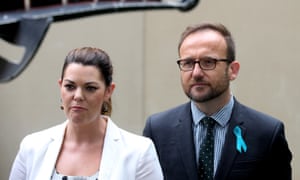The Greens are proposing a new national energy storage target of 20
gigawatts by 2030 to help drive the switch to renewables at both the
household level and across the energy grid.
The new policy will be announced on Wednesday ahead of meetings between the Greens climate and energy spokesman, Adam Bandt, and key industry players, such as the Australian Energy Storage Council, Tesla, the US firm AES Energy Storage, and Suntrix.
The storage policy is modelled on the design of the federal renewable energy target. It would contain incentives for households and small business to take up storage, and grid scale measures including funding of $2.2bn to contract and build new storage capacity across the national electricity market, and in Western Australia and the Northern Territory, which are separate.
While Malcolm Turnbull has put a lot of focus on the need to have sufficient reliable dispatchable power in the grid, including base-load power from ageing coal assets like the Liddell power plant in New South Wales, Bandt said Australia doesn’t have a base-load problem, “we have a peak-load problem”.
He said policymakers have to look at flexible generation and at boosting energy storage to manage a successful transition to lower emissions electricity.
“To have an orderly energy transition away from coal and gas we need
energy storage throughout the system,” Bandt said on Wednesday.
“This includes batteries in homes and businesses to reduce demand, as well as on the grid to provide frequency control. We also need small- to medium-scale pumped hydro to provide flexible generation to complement wind and solar.”
The target of 20GW aims to underpin a larger penetration of renewables in the grid.
The storage policy would also be complemented by changes to the national electricity market rules, including reform of the frequency control and ancillary services market to allow participation of energy storage in fast frequency response.
The Greens also favour shifting to a five-minute settlement rule for the wholesale energy market – which is a change championed by a number of experts to prevent gaming of prices on the wholesale market.
The release of the new policy follows a public meeting in Adelaide on Tuesday night with Bandt and the Greens senator Sarah Hanson-Young, which was attended by wind energy players Infigen and DP Energy.
Hanson-Young said the renewable energy target was promoting local investment like the planned solar thermal power plant in Port Augusta, and battery storage solutions, but she said the investment under way in the state needed to be supported by a national plan.
The move by the Greens comes as the Turnbull government continues its efforts to resolve a new national energy policy, and the prime minister entered an agreement with the gas companies on Tuesday to increase domestic supply to prevent shortages.
The new policy will be announced on Wednesday ahead of meetings between the Greens climate and energy spokesman, Adam Bandt, and key industry players, such as the Australian Energy Storage Council, Tesla, the US firm AES Energy Storage, and Suntrix.
The storage policy is modelled on the design of the federal renewable energy target. It would contain incentives for households and small business to take up storage, and grid scale measures including funding of $2.2bn to contract and build new storage capacity across the national electricity market, and in Western Australia and the Northern Territory, which are separate.
While Malcolm Turnbull has put a lot of focus on the need to have sufficient reliable dispatchable power in the grid, including base-load power from ageing coal assets like the Liddell power plant in New South Wales, Bandt said Australia doesn’t have a base-load problem, “we have a peak-load problem”.
He said policymakers have to look at flexible generation and at boosting energy storage to manage a successful transition to lower emissions electricity.
“This includes batteries in homes and businesses to reduce demand, as well as on the grid to provide frequency control. We also need small- to medium-scale pumped hydro to provide flexible generation to complement wind and solar.”
The target of 20GW aims to underpin a larger penetration of renewables in the grid.
The storage policy would also be complemented by changes to the national electricity market rules, including reform of the frequency control and ancillary services market to allow participation of energy storage in fast frequency response.
The Greens also favour shifting to a five-minute settlement rule for the wholesale energy market – which is a change championed by a number of experts to prevent gaming of prices on the wholesale market.
The release of the new policy follows a public meeting in Adelaide on Tuesday night with Bandt and the Greens senator Sarah Hanson-Young, which was attended by wind energy players Infigen and DP Energy.
Hanson-Young said the renewable energy target was promoting local investment like the planned solar thermal power plant in Port Augusta, and battery storage solutions, but she said the investment under way in the state needed to be supported by a national plan.
The move by the Greens comes as the Turnbull government continues its efforts to resolve a new national energy policy, and the prime minister entered an agreement with the gas companies on Tuesday to increase domestic supply to prevent shortages.

No comments:
Post a Comment